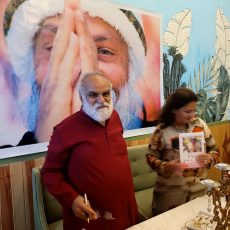Just the other day was the birthday of Omar Khayyam, and it was great to see that Google and Indian media was talking about him. Media has been a great disservice to humanity by focussing too much on the nonsense of the politicians and forgetting its wonderful mystics, musicians, poets, painters, and prophets who have always dedicated their life to raise the consciousness of humanity to higher levels. Omar Khayyam was such a person who added sweetness and ecstasy to our life, though he did have some dislike of the created by the corrupt and crafty rulers. He writes in one of his poems:
“This world
that was our home
for a brief spell
never brought us anything
but pain and grief;
it’s a shame that not one of our problems
was ever solved.
We depart
with a thousand regrets
in our hearts.”
Omar Khayyam
The historians tell us that Omar Khayyam’s full name was Ghiyath al-Din Abu’l-Fath Umar ibn Ibrahim Al-Nisaburi al-Khayyami. But he is popularly known as Omar Khayyam who lived 1048 – 1131. He was a brilliant student philosophy at Naishapur. He lived in a time that did not make life easy for learned men unless they had the support of a ruler at one of the many courts. However Khayyam was an outstanding mathematician and astronomer and he did write several works including Problems of Arithmetic, a book on music, and one on algebra before he was 25 years old. He had a scientific mind, a heart full of love, and his being was blessed with spiritual consciousness. The man himself remains something of an enigma. Different biographers have documented him as a fun-loving, wine-drinking agnostic; a closet Zoroastrian; a Sufi Muslim; an orthodox Sunni Moslem; and a follower of Ancient Greek philosophy.
Happyho also provides best Meditation and Tarot classes in Noida and Delhi NCR India area
He is famous for his poetry “The Rubaiyat of Omar Khayyam”. and is better known in the West than any other non-Western poet.
The fundamentalist priests were very much against him as they always are because his poetry became an inspiration for people to rejoice in life, and not feel any guilt. Khayyam says in his Rubaiyat: “Don’t be worried about your small sins. They are so small that God, out of his love, cannot even count them. And God is compassionate, he will forgive you.”
He says emphatically, “I guarantee that you will be forgiven, don’t be worried. What you are doing are just small things, and God cannot take note of these small things. He cannot be so nasty, so small-minded, so pigheaded!”
The priests became annoyed and angry and Omar Khayyam’s book was burnt several times. Osho tells us: Whenever a copy was found, it was burned by the priests because this man was teaching such a dangerous idea. If it spreads among human beings and everybody starts rejoicing in life, what will happen to the priests? What happens to the saints? What will happen to their mythologies of hell and heaven and god? All will disappear in thin air.
There has been a great misunderstanding about him also, which added to the displeasure of the priests. Osho pointed out: When Fitzgerald, a very talented poet, translated Omar Khayyam, a Sufi mystic, he did something almost impossible, because Omar Khayyam, in the original, does not seem to be so impressive as he becomes in the translation of Fitzgerald. And the reason is, Fitzgerald had no idea that Omar Khayyam was talking about God, not about a woman.
The Sufis call God Saki. Saki is the woman in the pub who pours wine for the customers. Particularly in the Arabic and Persian nations, the sakis are chosen just as in the West you choose Miss World, Miss universe, Miss America. The Saki is chosen just like that. The most beautiful girl in the city will become the saki. The most beautiful women move into the profession of being the saki. And Sufis call God “Saki”. Fitzgerald had no idea that Saki means, to a Sufi, God. He simply translated literally that Saki is a woman, and when Omar Khayyam says, “Saki, fill my cup full,” he thinks he is asking a woman to fill his cup full. And when Omar Khayyam says, “Even the wine is not so sweet as your kiss,” he is thinking of a woman; hence, his poetry becomes more romantic, more colorful. One who understands the Sufi terminology will not find much in Omar Khayyam.
Osho adds: You will be surprised that in Persia, Omar Khayyam is not known as a great poet. But in the whole world, Omar Khayyam is Persia’s most important poet, and this miracle has happened because of Fitzgerald. And you would not have enjoyed Omar Khayyam. He was a mathematician; that was the first mistake that Fitzgerald made: he did not realize that Omar Khayyam was a mathematician. Now, a mathematician writing poetry — you understand, it cannot be juicy. From where can a mathematician get juice? Then over and above that, he is a Sufi, a seeker of God. There is no place for any woman in his life; he lived a celibate life. Fitzgerald never bothered about the man’s life. Before he translated his poetry he should at least have looked to see whether this man was capable of writing poetry about women. He was a celibate mathematician! A Sufi! But Sufis remaining celibate think of God as a woman, dream of God as a woman, the most beautiful woman of course — there can be no comparison with God. So they pour all their sexuality on the image of God, the beloved.
Omar Khayyam is a Sufi mystic. His meditation is love and love–a thousand times love. He proclaims:
“How sad, a heart that
does not know how to love, that
does not know what it is to be drunk with love.
If you are not in love, how can you enjoy
the blinding light of the sun,
the soft light of the moon?”
Omar Khayyam





